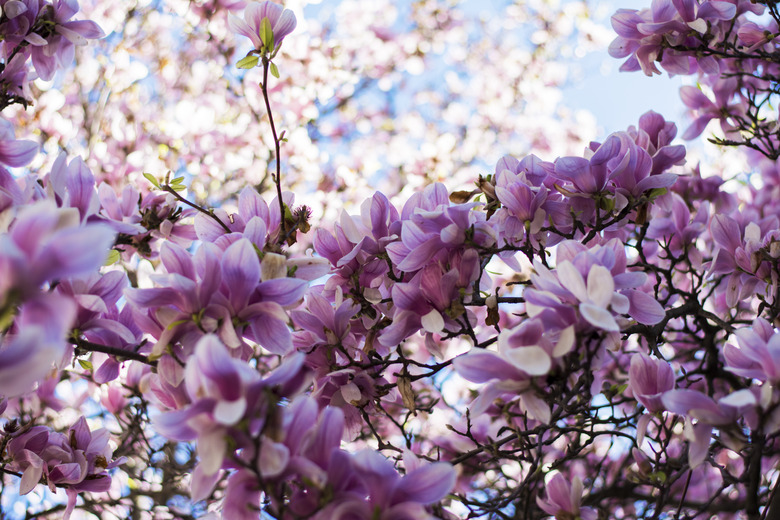How To Grow A Magnolia Tree From A Cutting
The three most frequently grown species in the Magnolia genus are those with star-shaped flowers, those with saucer-shaped flowers and evergreen species that are also called southern magnolias. Some species root best with softwood cuttings while others require semi-hardwood. The recommended auxin, or plant hormone, used to encourage rooting also varies by species.
Selecting and Removing Cuttings
Selecting and Removing Cuttings
Sterilize pruning shears or a sharp knife in a mixture of 1 part bleach to 9 parts of water or rubbing alcohol. You can take cuttings from anywhere on the tree and select them by the stage of their growth, not their width. A semi-hardwood cutting might be thinner than a softwood cutting. Look for healthy appearing twigs. Softwoods cuttings, taken early in the spring growing season, are new growth. They should snap easily when you bend them and have both full-size leaves and new, small leaves. Semi-hardwood cuttings, typically larger because they are taken in early summer, should be reasonably firm and have mature leaves. Cuttings taken from the end of stems root more easily than those taken from the center.
Starting the Cuttings
Starting the Cuttings
Take 4- to 6-inch-long, healthy appearing cuttings early in the morning when the tree is full of moisture. Remove the leaves from the bottom 1/3 to 1/2 of the cuttings. You'll insert the leafless section in the rooting mix. Also remove buds and flowers from the upper part of the cuttings so they can use their energy to grow new roots. Cuttings get moisture needed to grow roots through their foliage. Leave leaves on the upper part of cuttings. If you anticipate a delay in planting your cuttings, store them in a refrigerator. To root them, insert the leafless part of the cuttings vertically into the planting mix. Store magnolia cuttings of all species in an ice chest or dark plastic bag to keep them moist until they grow roots.
Rooting Star Magnolia Cuttings
Rooting Star Magnolia Cuttings
Cut sections of semi-hardwood from the deciduous star magnolia (Magnolia stellata) in July or August then dip the end into the auxin hormodin #2. Plant them in a rooting mix of 1 part peat and 1 part sand or 1 part peat and 1 part perlite with a bottom temperature, referring to the temperature at the surface of the mix, between 65 to 75 degrees Fahrenheit. Mist them enough to keep their leaves moist while they grow roots and store them in an ice chest or plastic bag to hold in the moisture. The cuttings should root 96 percent of the time in five to six weeks. Star magnolias will grow in U.S. Department of Agriculture plant hardiness zone 4 through 9.
Rooting Saucer Magnolia Cuttings
Rooting Saucer Magnolia Cuttings
Cut sections of softwood of the deciduous saucer magnolia (Magnolia soulangeana) in early April. Dip the freshly cut ends in the plant auxin Hormodin #3 and plant them in a mix of 1 part peat and 1 part sand or 1 part peat and 1 part perlite with a bottom temperature of 65 to 75 F and mist their foliage to keep it moist. Keep them in an ice chest or plastic bag to maintain humidity. They should root in five to six weeks. Also called tulip tree or Japanese magnolia, the saucer magnolia will grow in USDA zones 4 through 9.
Rooting Evergreen Magnolias
Rooting Evergreen Magnolias
Cut sections of softwood from evergreen sweetbay (Magnolia virginiana). Wound one side of their bottom end, opposite the end with the buds that you removed, then dip them into a powdered plant auxin, a 3000 parts per million solution of IBA (Indolebutyric acid) talc. Tap off the excess talc and plant the cuttings in a rooting mix of 1 part peat and 1 part sand or 1 part peat and 1 part perlite. If you mist them enough to keep the their leaves moist and store them in an ice chest or plastic bag, the cuttings should root in six to eight weeks in a bottom temperature of 75 to 78 degrees F. Sweetbay magnolias will grow in USDA zones 6 through 9.
Care After Planting
Care After Planting
If you plant more than one magnolia cutting, make sure they're spaced far enough apart to let sunlight reach their leaves, but they should not be in direct sunlight. For a 6-inch cutting with 4 inches above the ground, that would be 8 to 10 inches between cuttings. To increase their chances for survival, transplant them into a planting bed or container to let them harden before moving them to your landscape.
References
- University of California-Davis: Magnolia Stellata
- University of California-Davis: Magnolia Soulangeana
- Floridata: Magnolia Stellata
- Floridata: Magnolia Soulangeana
- North Carolina State University: Plant Propagation by Stem Cuttings: Instructions for the Home Gardener
- University of Florida IFAS Extension: Magnolia Virginiana
- Floridata: Magnolia Virginiana
- Texas A&M University Extension: Propagation of Ornamental Trees, Shrubs, and Woody Vines
